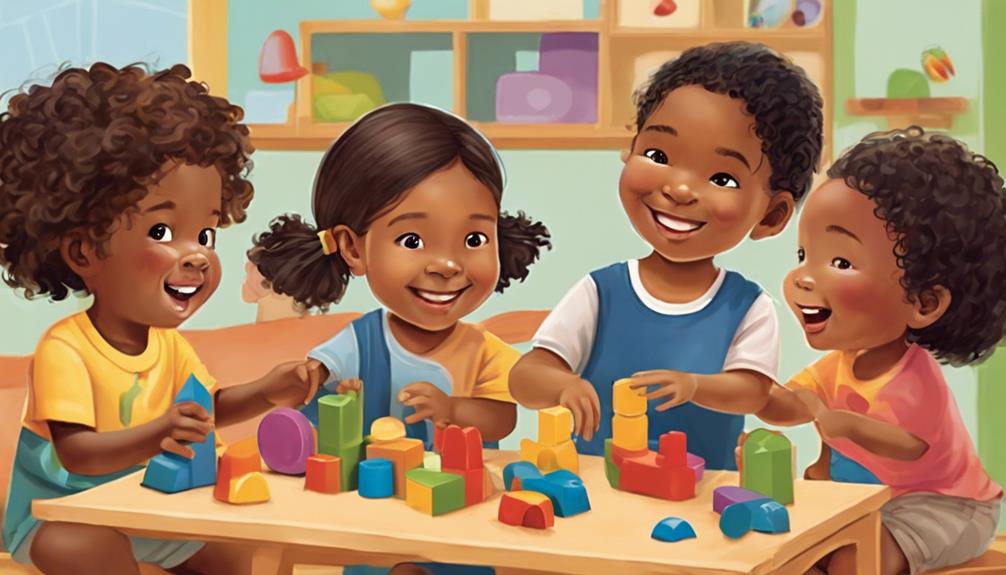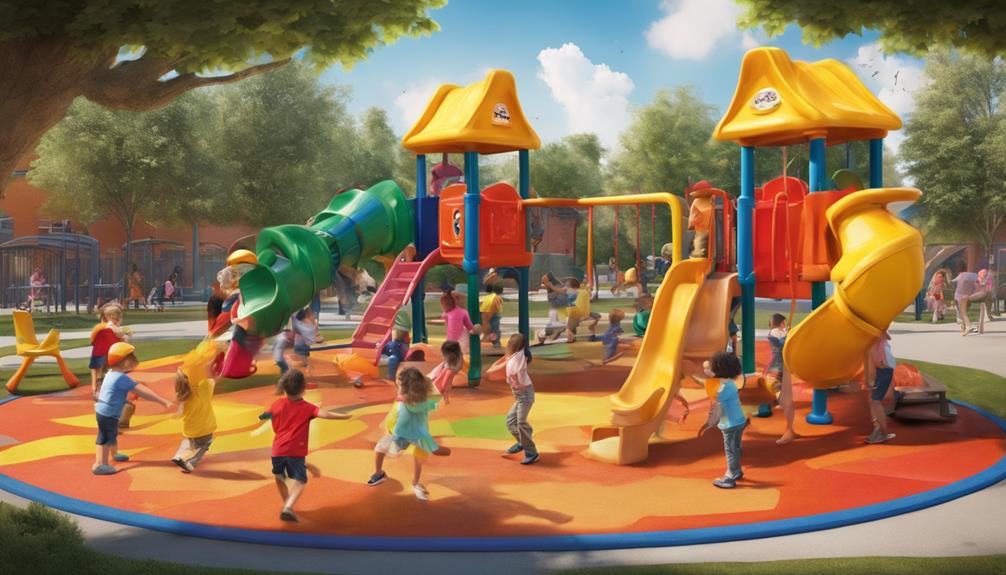As we delve into the 4 Developmental Domains in Child Development, it is interesting to observe that by the age of three, a child’s brain has reached 80% of its adult size. This early stage establishes the groundwork for lifelong learning and development.
Understanding how physical, cognitive, social-emotional, and language domains intertwine is important for nurturing a well-rounded individual. Each domain plays an essential role in shaping a child's future and interactions with the world around them.
Let's uncover the intricate connections between these domains to grasp the full spectrum of child development.
Key Takeaways
- Physical, cognitive, social-emotional, and language domains are interconnected in child development.
- Milestones in motor skills and cognitive development are crucial for a child's growth.
- Social skills like communication and empathy play a vital role in building relationships.
- Developing emotional intelligence and coping strategies are essential for managing feelings effectively.
Physical Development Domain
Physical development in children encompasses the growth in size, strength, and motor skills important for their overall well-being and independence. As children grow, their fine motor skills, such as grasping objects and writing, develop alongside their gross motor skills, which involve larger muscle movements like jumping and climbing. Proper nutrition plays an essential role in supporting this physical development, providing the necessary fuel for muscle growth and coordination. Sensory development also plays an essential role in helping children coordinate their movements and interact effectively with their environment.
Observing children as they navigate their physical world is a fascinating journey. From the first tentative steps to the confident strides, each milestone in their motor skills development is a cause for celebration. It's heartwarming to witness their coordination improving, muscle movements becoming more controlled, and their overall confidence growing as they master new physical challenges. Providing a nurturing environment that encourages exploration and movement is key to fostering a child's physical development.
Cognitive Development Domain

Engaging in cognitive activities like puzzles and games enhances children's reasoning and problem-solving abilities, laying a strong foundation for academic success. In the developmental journey of cognitive skills, children progress through various stages, including sensorimotor and change stages before reaching the formal operational stage. These stages mark important cognitive milestones, shaping how children approach logical thinking, abstract thinking, and problem-solving.
During the sensorimotor stage, infants learn about the world through their senses and actions. As they shift to the preoperational stage, children start to develop symbolic thought and language skills, laying the groundwork for more complex cognitive processes. In the concrete operational stage, they become more adept at logical reasoning and problem-solving in tangible situations. Finally, in the formal operational stage, adolescents can think abstractly and reason about hypothetical scenarios, further refining their cognitive abilities.
Encouraging children to explore, ask questions, and engage in critical thinking activities supports their cognitive development, fostering a strong intellectual foundation for future academic endeavors.
Social Development Domain

In the world of social development, managing relationships and understanding societal expectations are pivotal aspects in a child's developmental journey. Social development encompasses a wide array of skills that are essential for steering the complexities of human interactions. From learning to communicate effectively to mastering the art of cooperation, children engage in various social activities that shape their understanding of the world around them.
To highlight the importance of social development, let's explore a table that showcases key elements within this domain:
| Social Skills | Description | Importance |
|---|---|---|
| Play | Essential for social learning | Enhances creativity |
| Communication | Necessary for expressing thoughts | Fosters connection |
| Cooperation | Critical for teamwork | Builds relationships |
| Empathy | Promotes understanding | Encourages compassion |
| Conflict Resolution | Teaches problem-solving | Enhances emotional growth |
Through play, communication, cooperation, and conflict resolution, children not only develop social skills but also cultivate empathy, sharing, and emotional well-being. These foundational elements pave the way for healthy relationships, resilience in conflicts, and a strong sense of belonging.
Emotional Development Domain

Exploring the intricate landscape of emotional development, children set off on a journey of understanding and managing their feelings, fostering resilience, and cultivating empathy towards others. In this domain of social-emotional development, emotional milestones play an important role in shaping a child's well-being.
Here are some key aspects observed in the domain of emotional development:
- Recognizing and labeling emotions
- Expressing feelings appropriately
- Developing coping strategies
- Building secure attachments
Through modeling behaviors, experiencing consequences, and receiving support from caregivers, children learn the art of emotional regulation. Positive social interactions and consistent caregiving provide a fertile ground for healthy emotional development.
Teaching emotional intelligence skills such as self-awareness, self-regulation, and social skills equips children with the tools necessary to navigate the complexities of their emotions effectively. This journey towards emotional maturity is enriched by the connections and experiences that shape a child's emotional landscape.
Frequently Asked Questions
What Are the 4 Domains of Child Development?
We believe the 4 domains of child development are physical, cognitive, social-emotional, and language. Each area plays an essential role in a child's growth and understanding of the world around them.
What Are the Four Domains of Development Do You Think That It Is Important to Analyze These Domains Why or Why Not?
We absolutely believe it's essential to analyze the four developmental domains. Each domain influences a child's growth uniquely. By understanding these areas, we can tailor support, leading to well-rounded development in children.
What Are the Four Areas of Development Explain Each?
We view child development through four key domains. Physical growth involves motor skills and senses. Cognitive development focuses on intellect and problem-solving. Social-emotional growth includes understanding emotions and building relationships. Language development encompasses communication and vocabulary.
What Are the Four Key Areas of Child Development According to the Child Development Theory?
Do you ever ponder the essence of child development? The four key areas, physical, cognitive, language, and social-emotional domains, intricately shape growth. They intertwine, creating a tapestry of skills and emotions crucial for holistic development.
– What are the specific developmental domains that the tracking tool measures in children’s growth and development?
The tracking tool measures various developmental domains in children’s growth and development, including physical, cognitive, social, emotional, and language skills. By tracking growth in children’s development over time, parents and educators can identify areas of strength and areas in need of additional support to ensure holistic development.
Conclusion
As we wrap up our exploration of the 4 developmental domains in child development, it's fascinating to note that studies have shown that children who engage in regular physical activity tend to have better cognitive abilities and social skills.
This highlights the interconnected nature of these domains and the importance of holistic development. By nurturing all aspects of a child's growth – physical, cognitive, social-emotional, and language – we can help them thrive and reach their full potential.







